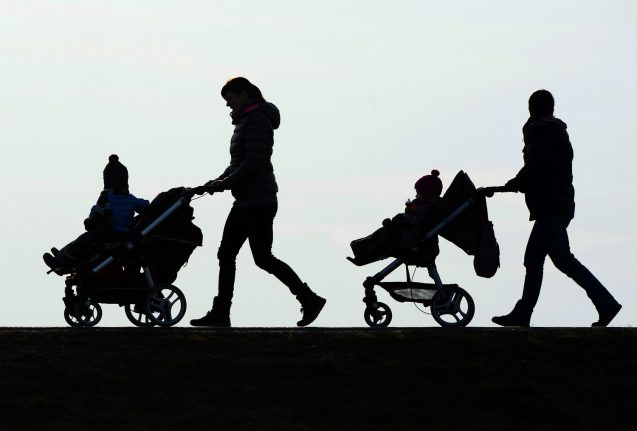Parents of premature babies will in future receive an extra month’s allowance if the child is born at least six weeks before the due date, under a draft bill for parental benefit reform (Elterngeldreform).
The bill, which has been submitted to the cabinet by the Family Ministry, also allows for mums and dads who want to work part-time while receiving parental benefits more opportunities to do so.
Meanwhile, if the plans are given the green light, couples with an annual income of more than €300,000 will no longer be entitled to benefits. At the moment the limit is €500,000.
Parental allowance is intended to provide financial security to mothers and fathers during Elternzeit (parental leave) after the birth of a child.
The state supports parents with a monthly sum ranging from €300 to a maximum of €1800 per month -– depending on the net income before the birth of the child.
Parental allowance is paid for a maximum of 14 months if both are involved in childcare. The payment period can also be extended further (ElterngeldPlus). In return, the monthly payments are smaller.
According to Family Minister Franziska Giffey (SPD), the state spends more than €7 billion annually on Elterngeld.
READ ALSO: Kindergeld – what you need to know about Germany’s child support payments
Why exactly are the changes being made?
Giffey wants to use the reform to gear parental benefits even more towards partnership.
Mothers and fathers who are receiving parental benefits but want to return to work part-time will in future be allowed to work 32 hours per week instead of the current 30 hours without losing their entitlement to the allowance.
That means, for example, a four-day week will be possible, the draft says.
The rules for the so-called ‘partnership bonus’ will also be relaxed. This is an additional parental allowance that couples can receive if both parents work a certain number of hours part-time and therefore share the care of their children.
The bonus strengthens the participation of fathers, according to the bill. However, only a small number of parents have made use of it so far.
Giffey wants to give more support to parents of babies who were born particularly early. They are to be given an additional month of parental allowance, “in order to be better able to absorb possible developmental delays of their child”.
The Family Ministry wants to see the new rules come into force next year.
 Photo: DPA
Photo: DPA
But for this to happen, the reform must first be approved by the cabinet and then by the Bundestag and Bundesrat.
Who qualifies for Elterngeld?
To receive parental allowance in Germany, new parents must:
-
be resident or normally resident in Germany
-
look after and raise the child themselves
-
be primarily responsible for the child and live in the same household as the child
-
work for no more than 30 hours a week (although this is likely to change to 32 hours if reform goes ahead)
What about foreigners in Germany?
If you’re a citizen of an EU country or Iceland, Liechtenstein, Norway and Switzerland, you may receive parental benefit if you live and work in Germany.
You may also be entitled to the allowance if you are a citizen of a third country (non-EU or EEA) if you have a residence permit (Aufenthaltstitel) that allows you to work in Germany. That means if you have a permanent residence card, or another type of residence permit such as an EU Blue Card, you will be entitled to Elterngeld.
Parental allowance is available for the employed, self-employed, unemployed, students, trainees, adoptive parents and, in exceptional cases, for relatives.
READ ALSO: These are the changes families in Germany need to know about in 2020
How much will you receive?
Parental allowance compensates for the loss of net income for the parent looking after the child. The rate at which the allowance is paid is calculated based on the amount of income before the birth of the child:
-
Net income over €1,240 = replacement rate 65 percent.
-
Net income between €1,000 and €1,200 = replacement rate 67 percent.
(Net income between €1,200 and €1,240 gradual reduction to 65 percent)
-
Net income lower than €1,000 = replacement rate increases gradually to 100 percent.
The parental allowance amounts to a minimum of €300 and a maximum of €1,800.
What happens when you have more than one child?
For multiple children, the parental allowance increases by €300 for each additional child. Families with an older child under three years of age (or two older children both under six years old) benefit from a sibling bonus.
How is the money paid out?
The basic parental allowance can be claimed within the first 14 months of the child’s life.
A parent can receive parental allowance for a minimum of two and a maximum of twelve months. Parents have an additional two months if both parents use the parental allowance and they lose at least two months’ pay.
Parents can share the monthly allowance freely between themselves. They can receive parental allowance one after the other or at the same time.
While claiming parental allowance, it is possible to work part time for up to 30 hours per week (although that is set to change).
READ ALSO: How each German state plans to lower childcare and Kita costs for families
For the calculation of the unemployment allowance II (Arbeitslosengeld II), social security benefit and the children’s allowance, parental allowance has been fully taken into account as income since 2011.
How do you apply?
Parents can find the form at their local government office or by searching online depending on what their local authority is.
Is every new parent entitled to it?
No. There is no entitlement to the allowance if the parent has earned more than €250,000 in the calendar year before the birth of the child (or if the total income for both beneficiaries exceeds €500,000) – but that is set to change too.
Parents can also benefit from the ‘allowance plus’ (Elterngeld Plus). For more information visit this government website.



 Please whitelist us to continue reading.
Please whitelist us to continue reading.
Member comments